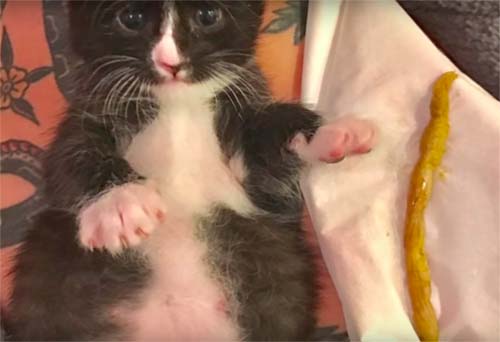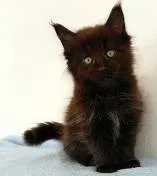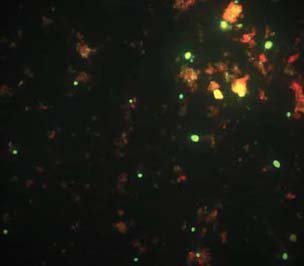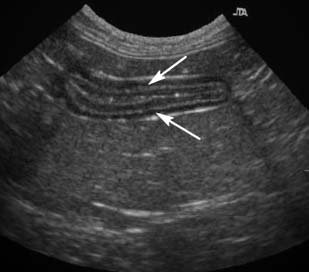What You Need to Know
When a kitten has diarrhea, he or she should see a veterinarian as soon as possible. Kittens can quickly become dehydrated, suffer from sepsis (harmful bacteria), gastrointestinal hemorrhage and become hypoglycemic (sugar deficiency). Kittens are known to look fine one moment and then ill the next.
Most cases that are limited to one incident do not require intervention by any therapies. There are many possible causes behind your kittens bad diarrhea. Diarrhea in kittens can be a minor issue, or it can be a sign of a much more serious sickness. If diarrhea is the only symptom your kitten has it is only a minor danger, primarily because of the risk of dehydration.
Warning signs of an immediate problem include vomiting, bloody stool and lethargic behavior. Kitten diarrhea is runny unformed stool. Your poor little kittens food has passed undigested through her small intensities and comes out the other end as runny, unformed stool. When the proper digestion process is interrupted your kittens food continues through the small and large intestines undigested.
A veterinarian will do a physical examination and check the stool for bacteria or parasites. There are also tests for problematic viruses such as feline leukemia and FIV (feline immunodeficiency virus). If the cause is not identified, the vet will do a blood test, urine test and possibly an abdominal ultrasound or x-ray. The veterinarian will also consider problems such as a food intolerance and consider factors such as toxic exposure and infection.
Issues seen in adult cats such as cancer, inflammatory bowel disease and immune-medicated diseases are rarely seen in kittens.
The best approach for managing diarrhea in kittens is to:
- Determine the cause
- If food, determine which food is causing the intolerance or food sensitivity
- Treat with conventional medications if needed or natural approaches such as probiotics, high protein, low carbohydrate diets.
 Normal Color Stool For a Kitten That Is On Kitten Formulat
Normal Color Stool For a Kitten That Is On Kitten FormulatChronic vs. Acute Diarrhea
Chronic diarrhea refers to cases where the condition relapses or is persistent over 3 to 4 weeks. Acute diarrhea refers to a case that is self-limiting and that doesn't require a full medical work up.
Chronic cases are solved using a step-by-step approach to reach a definitive diagnosis and then a treatment plan.
Video: How to Treat Kitten Diarrhea
Video providing advice for treating kitten diarrhea.Common Causes of Diarrhea in Kittens
Parasites
Intestinal parasites are common in kittens. Tapeworm is one of the most common, and if left untreated can cause your kitty stunted growth and diarrhea. Other parasites that can cause diarrhea in kittens are
- Roundworms
- Giardia
- Coccidia
- Trichomonosis
- Cryptosporidiosis
- Worms (hookworms, tapeworms, threadworm/Strongyloides stercoralis)
You vet can do a microscopic examination of a stool sample to determine if parasites are behind your diarrhea kitten.
Dietary Overload
Actually this is more common in full-grown cats, but sometimes greedy kittens can experience it too. This is when your kittens colon can't keep up with the volume of food passing through the system.
Change in Diet
 Speak to Your Veterinarian About Any Kitten With Diarrhea Due to the Risk of Dehydration
Speak to Your Veterinarian About Any Kitten With Diarrhea Due to the Risk of DehydrationFelines are creatures of habit. Even a minor change done abruptly in your kittens diet could cause your kitty to get an upset stomach. When changing your kitten to a new food, do it over a few days. Mix a little of the new brand in , gradually using more of the new and less of the old brand.
Poisons
If you suspect your feline has ingested any household cleaning products - go to your vet immediately. Some house plants can also be poisonous to kittens, if you suspect your kitten has been eating your house plants, let your vet know all plant types you have.
Anxiety
Kittens feel stressed too. Have you moved recently? Made some other big change that your kitty may feel affected by? Help keep your kitten less anxious by making sure they have familiar toys and blankets around when experiencing new things. This will reduce kitten diarrhea caused by anxiety.
Giving Your Feline "Human Food"
Table scraps may be the culprits behind your kittens diarrhea. Kittens also should not be feed greasy fatty fried foods as this plays havoc on their delicate tummies.
Other Reasons Your Kitten Has Diarrhea
There are more potential causes behind your felines diarrhea. These include inflammatory bowel disease, feline leukemia, food allergy, antibiotics, hyperthyroidism, cancer and diabetes.
It is also possible your kitten has a viral or bacterial infection due to your kittens young immune system. The two worst are feline infectious peritonitis and feline distemper.
Potential viral disease are:
- Feline Panleukopenia
- Hemorrhagic Calcivirus
- Rotavirus
- Astrovirus
- Enteric Coronavirus
- Feline infectious Peritonitis (FIP)
- Bacterial Infection
Other causes include:
- Ingesting foreign substances
- Nutrition issue
- Inflammatory Bowel Disease (IBD)
- Neoplasia (cancer)
What You Should Do About Kitten Diarrhea
Please take your kitten to the vet if you are still unsure what is behind her diarrhea. Your vet can't confidently determine what is causing your kittens diarrhea without examining her based on a specific diagnosis and treatment plan.
Go straight to the vet for your diarrhea kitten if...
- Your kitty is suffering from acute diarrhea, and has other symptoms such as vomiting, difficulty walking or fever.
- Your kitten has had diarrhea for over 24 hours.
- Your kitten has been eating your houseplants (inform your vet what plants you have, it may save your kittens life!).
- There is blood in your kittens stool.
- Your feline has ingested household cleaners, these could poison your kitten.
- If you are not sure about what is behind your kittens diarrhea - contact your vet.
Diagnosis
The veterinarian will work to categorize the diarrhea as occurring in the small bowel or large bowel as a point of origin. The vet will also take a history to determine if the underlying causes is a factor such as diet, environment, parasite exposure, medications or a toxin.
The veterinarian will ask about:
- duration and daily frequency of the diarrhea
- consistency of the feces (blood, mucus, color)
- deworming history
- any aggravating factors
- urgency of defecation
Treatment Based on Diarrhea Symptoms
Diarrhea with No Other Symptoms
If the kitten is well (normal eating and drinking) the veterinarian will do a physical exam, monitor the kitten and provide oral fluids. The condition will be treated with the medication Fenbendazole.
If the diarrhea does not resolve in 5 to 7 days, then the veterinarian will test the feces for parasites (ELISA, PCR tests). If the tests come back positive, treatment will be as described in the next section. If this does not stop the diarrhea, then the veterinarian will look at factors such as diet and conduct additional tests (blood, for viruses, B12 levels, TLI level and an ultrasound to look for any mechanical issues).
Diarrhea, Lethargic, Appetite Loss and Dehydrated Kittens
If the kitten is suffering from diarrhea, acting lethargic and is dehydrated, the veterinarian will test for parasites (ELISA, PCR on a fecal culture.). If a diagnosis is confirmed, that the diarrhea will be treated as described below for parasites.
If the tests come back negative, the veterinarian will consider diet, viruses (FeLV/FIV), vitamin B12 levels, TLI levels (enzyme test) and will conduct an ultrasound to detect an foreign objects or mechanical problems.
Vomiting, Pain with Bleeding and Diarrhea
In the case where the kitten is suffering from pain along with bleeding, imaging tests are needed to determine the cause. If the images do not reveal the problem, then the feces is tested for parasites. If this comes up negative then diet, viruses (FIV, FeLV), vitamin levels (B12 and a TLI test (enzymes) are reviewed.
p.p1 {margin: 0.0px 0.0px 0.0px 0.0px; font: 7.0px Times}
Treatment
Parasites and Infections
Giardia in Kittens
The leading cause of diarrhea in kittens is giardia with the disease found in 1% to 12% of all cats. In kittens, diarrhea caused by giardia will smell, appear pale in color and contain mucous. The diarrhea occurs right after being infected.
Diagnosis:
Diagnosis of giardia in kittens is done by examining a stool sample using a DIF test (Direct immunoflourescense), SNAP or ELISA test. Tests are up to 90% accurate. Giardia needs to be differentiated from causes that produce similar symptoms such as the ingestion of grass or pollen.
 A DirectImmunoflourescense Assay Test (DIF) can detect the presence in feces of kitten diarrhea causing giardia (green flourescent shapes)
A DirectImmunoflourescense Assay Test (DIF) can detect the presence in feces of kitten diarrhea causing giardia (green flourescent shapes) Treatment:
Treatment includes antiprotozoal therapy plus cleaning the kitten's environment. Medications used include Metronidazole (some concern with the possible side effect neurotoxicosis which is toxicity in the nervous system) and Fenbendazole (primary treatment ) . Fenbendazole side effects are rare.
Be sure to thoroughly clean the kitten's floor area, cage, litter pan). When cleaning floors use a mix of bleach and water.
Caution:
Giardia can spread from kittens to humans so proper handling is required.
Trichomonosis (T foetus or Tritrichomonas feotus)
Tichonomosis is a protozoal organism that infects the large intestine. It is caught from contact with other animals. It is often misdiagnosed and mistaken for giardia. Is is possible that cats are infected with both Tritrichomonas feotus and giardia)
Most cases occur in kittens that are 9 months old that live in crowded conditions such as a shelter, but it can happen at any age.
Symptoms:
It causes chronic large bowel diarrhea which contains mucus, frequent bouts of diarrhea, blood streaks (hematochezia) and straining when making a bowel movement or when urinating. Diarrhea is foul-smelling.
Diagnosis:
Tichonomosis in kittens is diagnosed by examining the feces using some type of smear test (PCR testing)
Beyond the diarrhea, most kittens will appear active and alert.
Treatment:
There are no approved medications for trichomonosis. Antibiotics and Metronidazole are used experimentally. Ronidazole has been shown to clear the infection, but there are side effects such as liver toxicity. It should only be used when there is a definitive diagnosis.
Some infected cats will go into remission at 2 years of age with no treatment.
Caution:
The condition can spread from cat to cat.
Cryptosporidiosis
Cryptosporidiosis parvum is a parasite that infects the outer layer of the small intestines. Diarrhea can be mild or severe, short-term or long-term. It can also be life-threatening in some kittens.
Diagnosis:
Cryptosporidiosis is sometimes not diagnosed since symptoms are similar to Irritable Bowel Disease (IBD). The organisms are small, making them easy to miss in testing. The ELISA or immunofluorescence tests can detect the parasite.
Treatment:
Kitten diarrhea treatment for Cryptosporidiosis Parvum is challenging. There are human medications that can be tried in cats (azithromycin), but there is no medication that is specifically effective.
Worms
Fecal flotation tests can easily show if worms are the cause.
Most of the parasitic causes of diarrhea in kittens are typical (e.g., hookworms, roundworms, and strongyloides) and can be easily found on fecal flotation. However, therapeutic deworming should still be done in kittens that have diarrhea, even if the results of fecal testing is negative.
Treatment:
Kittens with diarrhea should receive treatment for deworming, even if tests come back negative for parasites.
Viral Diseases
There are several viruses that can cause kitten diarrhea. These are:
- feline panleukopenia
- hemorrhagic calcivirus
- rotavirus
- astrovirus
- enteric coronaviruss
- feline infectious peritonitis
If kitten symptoms include vomiting and diarrhea, FeLV, RIV or FIP viruses are the probable cause.
Of all the intestinal viruses, feline panleukopenia is of the greatest concern.
Feline Panleukopenia
Symptoms:
- diarrhea
- fever
- depression
- anorexia (loss of appetite)
- vomiting
Diagnosis:
A veterinarian will diagnose feline panleukopenia based on a physical exam and the kitten's medical history. There is also an antigen test that can be used for a definitive diagnosis (canine parvovirus antigen test). Cats that have reduced levels of neutrophils (neutropenia) are tested for panleukopenia virus.
Virus Treatment
Treatment for all viruses involves addressing the symptoms and related problems such as hypoglycemia (low blood sugar) via nutrition support and dehydration using fluid therapy. There is virus specific cure for diarrhea.
Bacterial Causes of Kitten Diarrhea
Bacterial causes of diarrhea in kittens includes:
- Salmonellosis
- Campylobacteriosis
- Clostridial infection
- Yersiniosis
- Tyzzer's disease (Bacillus piliformis)
- Colibacillosis
Diagnosis:
It is difficult to diagnose a bacterial infection as the cause of kitten diarrhea, because it is a challenge to find the bacteria in the cat's feces during testing . The veterinarian can collect 2 to 3 grams of fresh feces for lab testing. Specimens need to be examined within 2 hours after collection.
Fungal Diseases
Fungal diseases (histoplasma) are more likely to be found in adults and are not frequently seen in kittens.
Mechanical Causes and Foreign Objects
There are several mechanical causes of diarrhea:
- developmental problems (short bowel syndrome)
- inversion of one portion of the intestine on another (intussusception)
- obstruction
- foreign body (string, ribbon, plants, hair, bones)
Kittens are naturally curious and will ingest substances that can cause harm to their digestive tract. These substances can cause diarrhea and vomiting. Most foreign objects cause vomiting alone, but if objects travel further into the gastrointestinal tract, diarrhea becomes the dominant symptom.
Vomiting is the usual sign of an obstruction or foreign body as opposed to diarrhea.
Diagnosis:
An X-ray is needed to see what is causing any obstruction or some hint of the cause, such as the end of a string still visible in the mouth or detectable via palpitation.
Treatment:
Surgery is frequently needed to remove any object or to correct any physical abnormalities. Most treatments have a good prognosis with the exception of problems related to developmental abnormalities.
 An Ultrasonic Image of Lymphoma in a cat with Chronic Diarrhea
An Ultrasonic Image of Lymphoma in a cat with Chronic DiarrheaNutrition and Diet
Diet is a leading cause of diarrhea in kittens. Determining the best diet for your kitten can be complex. If you believe diet is the cause, then start by feeding your kitten a diet that is highly digestible. This means the diet has :
- low to moderate fat
- moderate protein
- moderate carbohydrates
- less to no artificial colors and flavors
- fewer preservatives
- low components such as lactose and gluten that may contribute to a food intolerance
Diets that are highly digestible contain ingredients that contribute to intestinal health such as:
- soluble fiber
- omega 3 fatty acids
- prebiotics or probiotics
- antioxidants
Probiotics help to restore the microflora in the gastrointestinal system and can be utilized to eliminate intestinal parasites.
Also note that not all kitten foods that are labeled highly digestible are the same. If one doesn't help stop the kitten diarrhea, another choice may work.
Feed your kitten the new diet for 2 weeks before determining if it is effective. You can also try alternative dietary formulations such as:
- hydrolyzed (for elimination diets down to fewer ingredients such as 1 protein)
- high-protein/low carbohydrates
- novel antigen
Carbohydrate Intolerance and Gastrointestinal Bacterial Change
Kittens can suffer from carbohydrate intolerance or a change in the bacterial or microflora in the gastrointestinal tract. The Microflora can be effected when there is a change, such as from canned to dry kitten food.
To correct these types of problems, see if the microflora can be corrected by changing to a low carbohydrate canned kitten food or adding probiotics as a supplement (similar to humans eating Activa Yogurt to correct the microflora).
Supportive Therapy When a Kitten Has Diarrhea
There are several supportive therapies when a kitten has diarrhea:
- Fluids: kitten quickly become dehydrated. Fluids are administered subcutaneous (under the skin) or intravenous (into a a vein).
- Gastrointestinal Protectants: prescription medications such as sucralfate or famotidine.
- Anti-vomiting agents if needed (maropitant, metoclopramide)
- Antimicrobal therapy: if bacterial infection is suspected
- Moist foods: to overcome dehydration, additional liquid such as chicken stock is added to food. Highly digestable foods such as cooked turkey or chicken to 5 to 10 days can help
- Deworming: the medication fenbendazole is tolerated well in kittens
Free Brochure on Kitten Diarrhea
Ask a Vet for Free
Ask Our Veterinarian a Question about Kitten Diarrhea for Free!
Do you have a kitten diarrhea related question you'd like our Vet to answer for free? Just enter it below.
What Other Visitors Have Asked about Kitten Diarrhea and Suggestions from Our Vet
Click below to see contributions from other visitors to this page...
Reader Question: Diarrhea in 6-Week-Old Feral Kittens – Possible Causes & At-Home Care Options Not rated yet
Reader's Question: This is regarding a feral kitten from my backyard. I can’t take him to the vet. He’s almost 6 weeks old with diarrhea. I’m giving him …
Diarrhea Not rated yet
Reader Question on Kitten Diarrhea Followed by Suggestion From Our Vet
One of my two kitten brothers has had diarrhea since I got him three months …
Pedialyte for Kittens with Diarrhea? Not rated yet
Reader Question: Can you give Pedialyte to Kittens?
I just adopted a Ferrell kitten from a farm. The kitten is maybe three months of age. I brought …
My Kitten Has Diarrhea Not rated yet
Reader Question
How can I treat my kitten for diarrhea. It is only 6 wks old.
Suggestion From Dr. Coates for Treating Kitten Diarrhea
…
Kitten with Bloody Diarrhea Not rated yet
One of my students was given a 10 day old kitten whose mother abandoned it. It has eaten kitty milk from her hand for three days and seems to be thriving. …
Where To Next?
Identifying and Caring for a Sick Kitten
References
Diarrhea in Kittens and Cats
D.L. Zoran
College of Veterinary Medicine, Texas A&M University
Marks SL, Willard MD. Diarrhea in Kittens: In August JR (ed) Consultations in Feline Internal Medicine, vol 5 St. Louis, MO